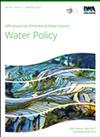Water governance challenges at a local level: implementation of the OECD water governance indicator framework in the General Pueyrredon Municipality, Buenos Aires province, Argentina
IF 1.8
4区 环境科学与生态学
Q4 WATER RESOURCES
引用次数: 0
Abstract
Considering that the current water crisis is largely a governance crisis, improving water governance will help address current and future water challenges. Water governance is defined as the range of political, institutional and administrative rules, practices and processes through which decisions are taken and implemented, stakeholders can articulate their interests and have their concerns considered, and decision-makers are held accountable for water management. The Water Governance Principles proposed by the OECD contribute to the creation of tangible public policies oriented towards effectiveness, efficiency, reliability and participation. The aim of this research is to apply the OECD Water Governance Indicator Framework at a local level and to identify gaps and challenges for water governance in the General Pueyrredon Municipality (GPM), Buenos Aires Province (BAP), Argentina. This framework was used as a diagnostic tool to assess water governance policy frameworks (what), institutions (who) and instruments (how). In general terms, there is a robust legal framework, there are enforcement institutions regarding water management and there is a good connection with them. However, the main challenges identified were in the ‘how’ since most of the instruments are partly or not implemented.地方一级的水治理挑战:经合组织水治理指标框架在阿根廷布宜诺斯艾利斯省普雷雷东市的实施
考虑到当前的水危机在很大程度上是一场治理危机,改善水治理将有助于应对当前和未来的水挑战。水治理被定义为一系列政治、体制和行政规则、做法和流程,通过这些规则、做法、流程做出和实施决策,利益相关者可以阐明自己的利益并考虑自己的关切,决策者对水管理负责。经合组织提出的水治理原则有助于制定切实可行的公共政策,以实现有效性、效率、可靠性和参与性。本研究的目的是在地方一级应用经合组织水治理指标框架,并确定阿根廷布宜诺斯艾利斯省普埃雷登市水治理的差距和挑战。该框架被用作评估水治理政策框架(什么)、机构(谁)和工具(如何)的诊断工具。总的来说,有一个健全的法律框架,有关于水管理的执法机构,并且与它们有着良好的联系。然而,确定的主要挑战在于“如何”,因为大多数文书都得到了部分实施或没有实施。
本文章由计算机程序翻译,如有差异,请以英文原文为准。
求助全文
约1分钟内获得全文
求助全文
来源期刊

Water Policy
环境科学-水资源
CiteScore
3.10
自引率
12.50%
发文量
81
审稿时长
6-12 weeks
期刊介绍:
Water Policy will publish reviews, research papers and progress reports in, among others, the following areas: financial, diplomatic, organizational, legal, administrative and research; organized by country, region or river basin. Water Policy also publishes reviews of books and grey literature.
 求助内容:
求助内容: 应助结果提醒方式:
应助结果提醒方式:


